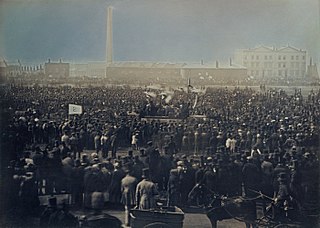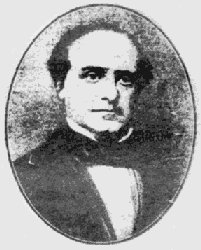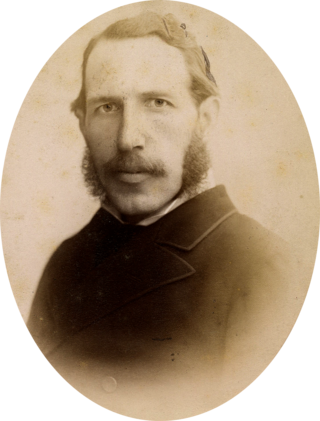Related Research Articles

Chartism was a working-class movement for political reform in the United Kingdom that erupted from 1838 to 1857 and was strongest in 1839, 1842 and 1848. It took its name from the People's Charter of 1838 and was a national protest movement, with particular strongholds of support in Northern England, the East Midlands, the Staffordshire Potteries, the Black Country and the South Wales Valleys, where working people depended on single industries and were subject to wild swings in economic activity. Chartism was less strong in places, such as Bristol, that had more diversified economies. The movement was fiercely opposed by government authorities, who finally suppressed it.
The Radicals were a loose parliamentary political grouping in Great Britain and Ireland in the early to mid-19th century who drew on earlier ideas of radicalism and helped to transform the Whigs into the Liberal Party.

Ernest Charles Jones was an English poet, novelist and Chartist. Dorothy Thompson points out that Jones was born into the landed gentry, became a barrister, and left a large documentary record. "He is the best-remembered of the Chartist leaders, among the pioneers of the modern Labour movement, and a friend of both Marx and Engels."

Michael Davitt was an Irish republican activist for a variety of causes, especially Home Rule and land reform. Following an eviction when he was four years old, Davitt's family migrated to England. He began his career as an organiser of the Irish Republican Brotherhood, which resisted British rule in Ireland with violence. Convicted of treason felony for arms trafficking in 1870, he served seven years in prison. Upon his release, Davitt pioneered the New Departure strategy of cooperation between the physical-force and constitutional wings of Irish nationalism on the issue of land reform. With Charles Stewart Parnell, he co-founded the Irish National Land League in 1879, in which capacity he enjoyed the peak of his influence before being jailed again in 1881.

The Manchester Martyrs were three Irish nationalists – William Philip Allen, Michael Larkin, and Michael O'Brien – who were hanged in 1867 following their conviction of murder after an attack on a police van in Manchester, England, in which a police officer was accidentally shot dead, an incident that was known at the time as the Manchester Outrages. The three men were members of the Irish Republican Brotherhood, also known as the Fenians, an organisation dedicated to ending British rule in Ireland, and were among a group of 30 to 40 Fenians who attacked a horse-drawn police van transporting two arrested leaders of the Brotherhood, Thomas J. Kelly and Timothy Deasy, to Belle Vue Gaol. Police Sergeant Charles Brett, travelling inside with the keys, was shot and killed while looking through the keyhole of the van as the attackers attempted to force the door open by shooting the lock.

Henry Hetherington was an English printer, bookseller, publisher and newspaper proprietor who campaigned for social justice, a free press, universal suffrage and religious freethought. Together with his close associates, William Lovett, John Cleave and James Watson, he was a leading member of numerous co-operative and radical groups, including the Owenite British Association for the Promotion of Co-operative Knowledge, the National Union of the Working Classes and the London Working Men's Association. As proprietor of The Poor Man's Guardian he played a major role in the "War of the Unstamped" and was imprisoned three times for refusing to pay newspaper stamp duty. He was a leader of the "moral force" wing of the Chartist movement and a supporter of pro-democracy movements in other countries. His name is included on the Reformers' Memorial in Kensal Green Cemetery.
Michael Barrett was an Irish activist. He was a member of the Fenians.

George Howell was an English trade unionist and reform campaigner and a Lib-Lab politician, who sat in the House of Commons from 1885 to 1895.

John O'Connor Power was an Irish Fenian and a Home Rule League and Irish Parliamentary Party politician and as MP in the House of Commons of the United Kingdom of Great Britain and Ireland represented Mayo from June 1874 to 1885. From 1881, he practised as a barrister specialising in criminal law and campaigning for penal reform.
Events from the year 1867 in Ireland.

John Bedford Leno was a Chartist, radical, poet, and printer who acted as a "bridge" between Chartism and early Labour movements, as well as between the working and ruling classes. He campaigned to give the vote to all common men and women, driven by a strong desire for "justice and freedom for all mankind". He was a leading figure in the Reform League, which campaigned for the Reform Act 1867. He was called the "Burns of Labour" and "the poet of the poor" for his political songs and poems, which were sold widely in penny publications, and recited and sung by workers in Britain, Europe and America. He was an entertaining and persuasive orator and his speeches were in great demand around London. He owned, edited and contributed to Radical and Liberal newspapers and journals, and printed and distributed bills advertising London Reform meetings and demonstrations. He wrote the international hit 'The Song of the Spade'.
The Reform League was established in 1865 to press for manhood suffrage and the ballot in Great Britain. It collaborated with the more moderate and middle class Reform Union and gave strong support to the abortive Reform Bill 1866 and the successful Reform Act 1867. It developed into a formidable force of agitation at the very heart of the country.
Benjamin Lucraft was a famous craftsman chair-carver in London where his radical inclinations led him to be involved in many political movements.

The word Fenian served as an umbrella term for the Irish Republican Brotherhood (IRB) and their affiliate in the United States, the Fenian Brotherhood. They were secret political organisations in the late 19th and early 20th centuries dedicated to the establishment of an independent Irish Republic. In 1867 they sought to coordinate raids into Canada from the United States with a rising in Ireland. In the 1916 Easter Rising and the 1919–1921 Irish War of Independence, the IRB led the republican struggle.

Lloyd Jones was an Irish socialist and union activist, advocate of co-operation, journalist and writer.

The Fenian Rising of 1867 was a rebellion against British rule in Ireland, organised by the Irish Republican Brotherhood (IRB).

The Clerkenwell explosion, also known as the Clerkenwell Outrage, was a bombing in London on 13 December 1867. The Irish Republican Brotherhood, nicknamed the "Fenians", exploded a bomb to try to free one of their members being held on remand at Clerkenwell Prison. The explosion damaged nearby houses, killed 12 people and left 120 injured. None of the prisoners escaped. The event was described by The Times the following day as "a crime of unexampled atrocity", and compared to the "infernal machines" used in Paris in 1800 and 1835 and the Gunpowder Treason of 1605. The bombing was later described as the most infamous action carried out by the Fenians in Britain in the 19th century. It enraged the public, causing a backlash of hostility in Britain which undermined efforts to establish home rule or independence for Ireland.
W. P. Roberts (1806–1871) was a noted Chartist who became known as the "attorney-general" of the coal miners in the 1840s.
Thomas G. Mottershead was a British trade unionist and socialist activist.
George William Wheeler was a British socialist activist, prominent in the First International.
References
- ↑ Robert C. Senior, "James Finlen: Chartist Reformer, Orator", 2023, pp. 2-3
- ↑ Breuilly, John; Niedhart, Gottfried; Taylor, Antony (1995). The Era of the Reform League: English Labour and Radical Politics 1857–1872. Mannheim: J & J Verlag. p. 339.
- ↑ "Andrew Whitehead, Fenians, Reformers and the Clerkenwell Outrage".
- ↑ Robert C. Senior, "James Finlen: Chartist Reformer, Orator", 2023
- ↑ George Howell manuscript autobiography in the Bishopsgate Institute